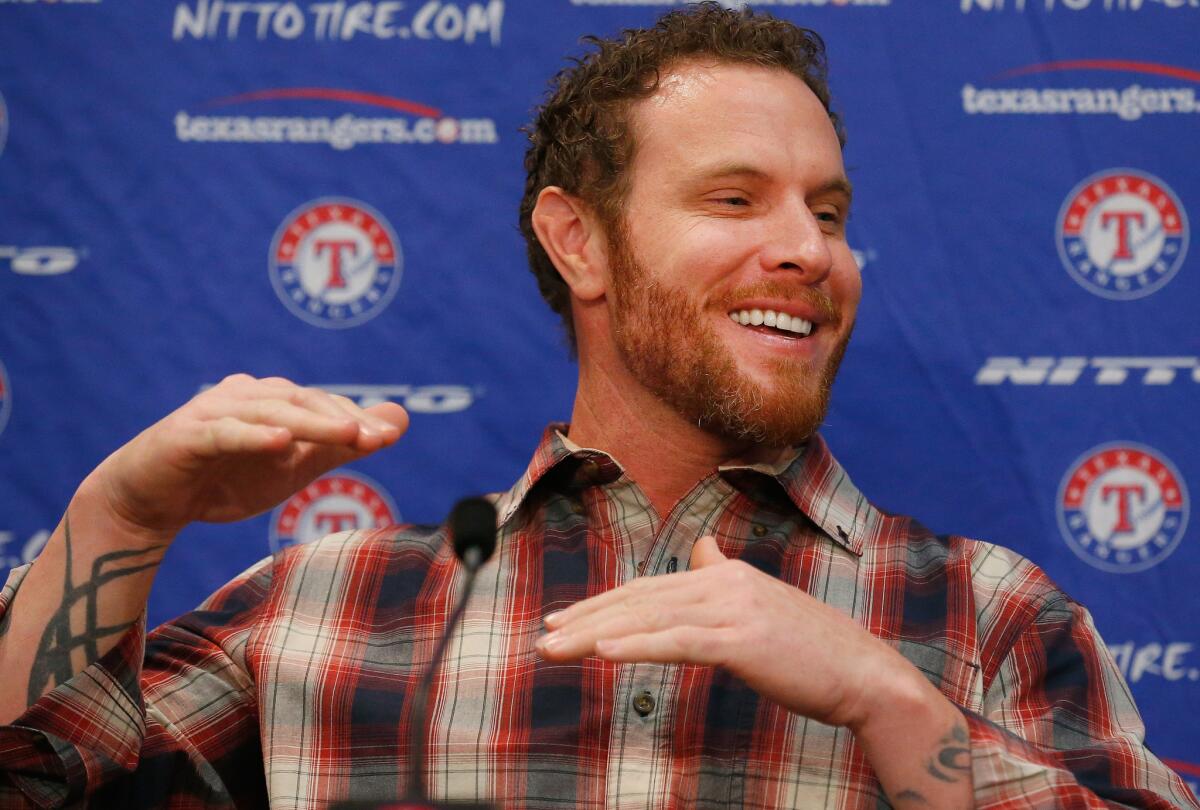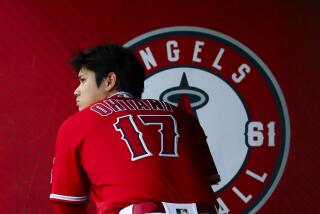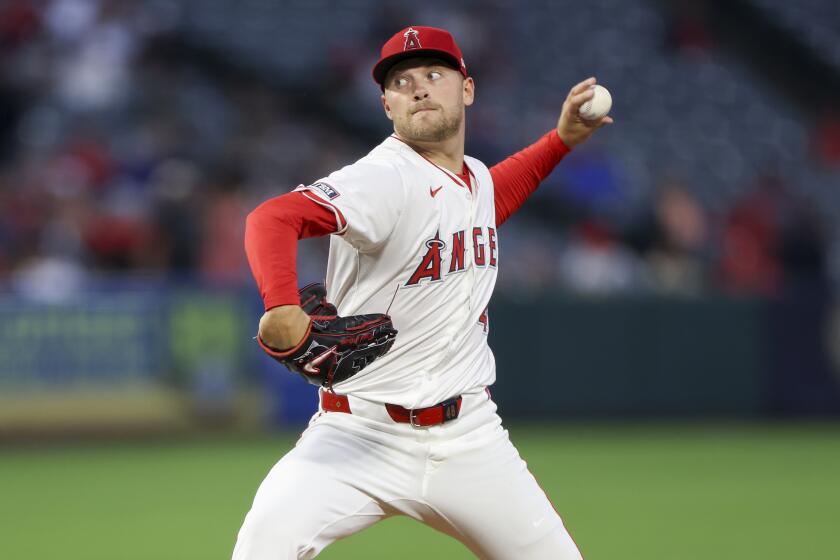Angels drop the ball in dumping Josh Hamilton

Outfielder
It’s one thing to overpay for aging first basemen or stumbling outfielders, it’s quite another to plunk down about $60 million for intolerance and insensitivity.
Yet, that’s what those fallen Angels did Monday in ridding themselves of their demon Josh Hamilton, shipping him and his addiction problems back to the Texas Rangers while eating nearly half of his $125-million contract just to get him out of their sight.
Only the expensive stench of Angels owner Arte Moreno’s anger remains.
The saga that began nearly three months ago when Hamilton admitted a relapse in his sobriety has finally ended with the slugger returning to a place where he experienced his greatest support and success. He was a most valuable player in Texas, a five-time All-Star, twice leading the Rangers to the World Series, and is thrilled to again be among friends.
“I’m back here, I’m back home,’’ said a clearly relieved Hamilton at a Monday afternoon news conference in Globe Life Park in Arlington, Texas. “I’m going to give everything I’ve got.’’
Before giving the Angels credit for generosity of spirit for trading Hamilton to his OK’d Corral, understand that Hamilton had a no-trade clause in his contract, and thus could have, and probably would have, halted a deal anywhere else.
And before praising the Angels for making the best of a bad situation, understand that they put themselves in this situation in the first place.
Three years ago, they signed Hamilton to that giant five-year deal even though they knew he had battled addiction his entire adult life. Yet, when he succumbed to the disease again this winter and reported a relapse to Major League Baseball, they suddenly quit on him.
They cleaned out his spring-training locker. They pulled his souvenir merchandise from their shelves. They waited for baseball to kick him to the curb, but when that didn’t happen — he was probably given a pass because he reported the relapse before failing a test — they howled.
Yes, they became one of the first teams in sports history to loudly complain that one of their players was not suspended.
To steal a line from the Angels’ seventh-inning stretch song, that’s not exactly building him up, buttercup.
“It defies logic that Josh’s reported behavior is not a violation of his drug program,’’ Angels President John Carpino said to The Times’ Bill Shaikin at the time.
Later, Moreno piled on by giving a chilling home opener interview in which he said he couldn’t guarantee that Hamilton would play for the Angels this season and, by the way, it was all Hamilton’s fault.
“We understand that he’s had struggles, and obviously he’s still having struggles, but the reality is there’s accountability,’’ Moreno said at the time. “When you make an agreement, you need to stand up.’’
Except, of course, when your chronic illness knocks you down.
To be fair to the Angels, before Hamilton’s relapse, he wasn’t holding up his end of the bargain on the field, going hitless in 13 postseason at-bats last fall, playing in only 89 games last summer, accumulating only a .739 OPS the previous season.
“Josh, from the moment he arrived here, there’s been turbulence,’’ General Manager Jerry Dipoto said in a conference call Monday. “If I can put a finger on why Josh had a tough time here, we may have been able to help him solve those issues.’’
So they were admittedly out of touch with their investment. Then when his relapse gave them a chance to dump him without paying him, they jumped at it. Moreno was looking for his excuse to get out of this bad deal, and thought he found it, even though it meant subjecting Hamilton to further public humiliation.
When major league baseball wouldn’t do his dirty work for him, Moreno paid about $60 million to have it done. Yet, now it is his organization, once reknowned for being so inclusive and family friendly, that carries the stain.
How hard will it be to listen to another Angel Stadium trademark song, ‘’Calling All Angels,’’ when you realize that Moreno tolerates only those unafflicted Angels? On the field, the team is 9-10 with an offense that has gone flat around Hamilton’s three left fielder-designated hitter replacements, Matt Joyce, C.J. Cron and Collin Cowgill, who are combining for a .199 average with two home runs and a dozen runs batted in.
How bad did the Angels want to get rid of Hamilton? They chose to burn maybe the most mad money in baseball history instead of waiting to see whether he could get hot again. Hamilton had three years and about $80 million left on his contract. The Rangers reportedly will pick up less than $7 million of it, and Hamilton is expected to forfeit at least $12 million to the Angels to offset the benefit of playing in Texas, where there is no state income tax.
Hamilton, who turns 34 next month, said he was recovered from off-season shoulder surgery and was ready to play. Why not send him to triple-A Salt Lake to see whether he could find himself again? He won an MVP award with the Rangers in the season after his last relapse, why not see whether the same resurgence happens again? And even if you still didn’t want him, couldn’t you have then commanded more for him in a trade?
“I worked my butt off to be that guy this year going into this season with the Angels,’’ Hamilton said Monday. “They just didn’t want that to happen for some reason.’’
You think?
Hamilton also challenge Moreno’s assertion that he was not accountable, saying, “I have no clue what he’s talking about. I showed up every day and played hard when I was there.’’
He added: “[Moreno] knew what the deal was when he signed me. Hands down, he knew what he was getting. He knew what the risks were. He knew all those things.’’
Moreno made his bed, and then he dumped it when the sheets became itchy, and if that doesn’t scare away prospective Angels free-agent prospects, nothing will.
Dipoto said the Angels had trade talks with other teams but Hamilton, who has a full no-trade clause in his contract, wanted to return to Texas, where he lives in the off-season.
“The reason I’m making certain changes in my life is I want to be OK after baseball is over,” said Hamilton, who will be tested for drugs and alcohol five times per week, up from three times per week in recent years. “I’ve done a lot of growing, learning and soul-searching over the last few weeks.”
In the end, the result is a good one, a winning one, for the Rangers and their troubled former star. Hamilton is in good hands. It is questionable whether the same can be said for the Angels.
More to Read
Go beyond the scoreboard
Get the latest on L.A.'s teams in the daily Sports Report newsletter.
You may occasionally receive promotional content from the Los Angeles Times.










